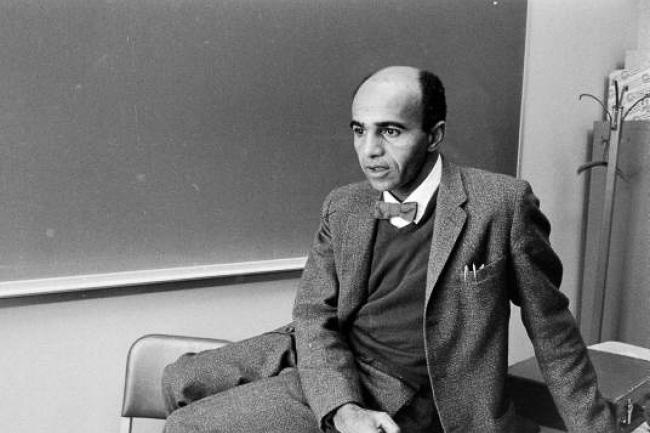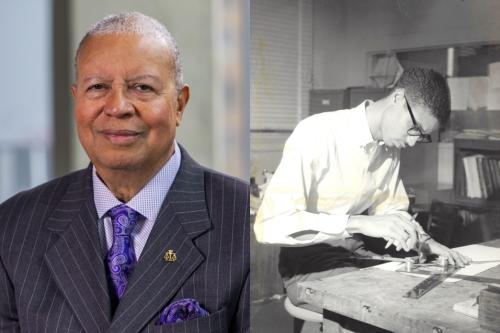As Howard University concludes its annual commencement exercises, the story of Dr. David Harold Blackwell resonates more than ever. One of the most brilliant mathematical minds in American history, Blackwell’s legacy is deeply woven into the intellectual fabric of Howard.
Now, in a time defined by artificial intelligence and high-performance computing, his name graces one of the world’s most advanced technologies: the NVIDIA Grace Blackwell superchip. This convergence of past brilliance and future promise offers the perfect lens through which to reflect on Blackwell’s life, his time at Howard, and the monumental impact of his work.
A Scholar from the Start
Born in 1919 in Centralia, Illinois, David Harold Blackwell exhibited academic excellence from an early age. He earned all three of his degrees, including his Ph.D., from the University of Illinois at Urbana-Champaign before the age of 22. But despite his remarkable credentials, the path forward was littered with barriers, especially racial discrimination. Prestigious institutions rejected his applications not on academic grounds, but because of the color of his skin.
In the face of exclusion, Blackwell chose elevation. In 1944, he arrived at Howard University, where he would lay the foundation for one of the most consequential academic careers in American history.
A Transformational Decade at Howard
Blackwell joined the Department of Mathematics at Howard during a critical period. The University was expanding its mission to build world-class departments in the sciences and mathematics, fields where Black scholars had been historically underrepresented.
Over the next decade, Blackwell played a transformative role. He revitalized the mathematics curriculum, introduced statistical theory courses, and served as department chair. His leadership helped position Howard University as a premier institution for Black mathematicians and scientists.
It was during this time that Blackwell’s intellectual curiosity began to align with the emerging fields of game theory and statistical decision theory, foundations of what we now recognize as data science and artificial intelligence.
His tenure at Howard also marked a meaningful chapter in his personal and civic identity. Blackwell helped to establish the Gamma chapter of Phi Beta Kappa, the nation's most prestigious academic honor society, at Howard in 1953. His creation of the society at an HBCU symbolized not just Black scholarly excellence, but the alignment of academic freedom with social progress. For Blackwell, Gamma was more than a distinction: it was a recognition that Black intellect and leadership belonged at the center of American academic life.
An Architect of Modern Thinking
After leaving Howard in 1954, Blackwell became the first Black tenured professor at the University of California, Berkeley. But his years at The Mecca remained formative, shaping his commitment to mentorship, clarity as a teacher, and belief in the power of education as a force for liberation.
His intellectual output is staggering. He co-authored “Theory of Games and Statistical Decisions,” a foundational text in game theory. He also published over 80 academic papers. Most famously, he co-developed the Rao-Blackwell Theorem, which remains a pillar of statistical inference. He became the first African American elected to the National Academy of Sciences, the first to hold a tenured full professorship at UC Berkeley, and was only the seventh African American to earn a Ph.D. in mathematics. In recognition of his groundbreaking contributions, President Barack Obama posthumously awarded him the National Medal of Science in 2012.
Blackwell was not merely advancing math, he was advancing thought itself. He once described himself as not especially interested in research. “I’m interested in understanding, which is quite a different thing,” he said.
The Grace Blackwell Superchip: A Namesake for the Future
In March 2024, NVIDIA launched the Grace Blackwell superchip, a revolutionary tool designed to support the next generation of artificial intelligence. The chip combines NVIDIA’s Grace CPU and Blackwell GPU to deliver performance levels capable of powering AI models with over a trillion parameters. It stands at the cutting edge of machine learning, robotics, and scientific computing.
The decision to name the chip in part after Blackwell is more than symbolic. It is a recognition of the intellectual framework upon which today’s AI systems are built, a framework that Blackwell helped construct. His work in information theory, game theory, and probabilistic models underpins many of the algorithms that define modern computing.
For Howard University, it is an extraordinary moment. The naming honors a son of the institution whose ideas now fuel the world’s most advanced machines. It underscores the truth that Black genius has always driven innovation, even if history has often failed to acknowledge it.
This year, as the University spotlights breakthroughs in AI, health equity, climate science, and beyond, Blackwell’s story reminds us that the roots of innovation often begin in the classroom, in mentorship, and in the quiet clarity of a mind committed to progress.
It is also a reminder of the role HBCUs like Howard have played and continue to play in shaping the future of global research. Institutions that once had to fight for legitimacy are now producing the thinkers, engineers, and visionaries who define it.





